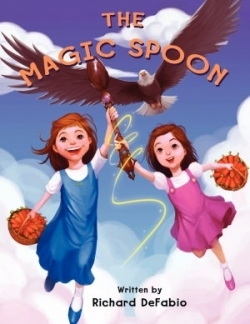The Magic Spoon
Beginning with “Once upon a time” and featuring elements of fantasy―magic and talking animals―The Magic Spoon is a modern-day fairytale. Beautifully illustrated characters enhance the simple story and will delight children while teaching them about honesty, kindness, and the virtues of sharing.
The Princess of Mariama, dressed in pink with tiara and pearls, is given a magic spoon by her father when she is a baby. A mean, jealous, and greedy Prince steals it from her, but he is distressed when he discovers that the powerful spoon will not obey a thief.
Many years later, the spoon is discovered by two kind children, Lucca and Valentina, when they are digging for carrots. They eventually discover that the spoon can make wishes come true. They do not realize, as the reader is to discover, the spoon’s magic works only for those who are honest and kind.
Richard DeFabio creates an intriguing magic spoon: metal, with strange markings of a little brown horse, blue house, red doll, and a purple button. And the writing is remarkably clean of errors. But there are several fascinating characters that the author does not use to his best advantage. There is no conflict with “the most unkind animals in the whole world,” the Centibizans, who live in a swamp. The creatures have small teeth, and they like to “bite everyone that comes near them one hundred times!” There is also little action between the malicious wolf and his nemesis Constantine, the giant and powerful eagle. Finally, the first-time author never shows the mean Prince getting his comeuppance.
However, there is an important lesson to be learned from this story: being jealous, being greedy, and breaking promises will all lead to unhappiness. The book is beautifully illustrated, and the two little girls are lovable and memorable. The story will appeal to young children, and people of all ages will appreciate the fabulous artwork.
Reviewed by
Mary Popham
Disclosure: This article is not an endorsement, but a review. The publisher of this book provided free copies of the book and paid a small fee to have their book reviewed by a professional reviewer. Foreword Reviews and Clarion Reviews make no guarantee that the publisher will receive a positive review. Foreword Magazine, Inc. is disclosing this in accordance with the Federal Trade Commission’s 16 CFR, Part 255.

